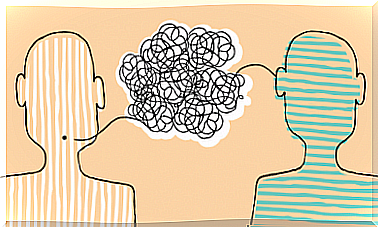Couple Separation Anxiety, What Does It Consist Of?

Any emotional breakdown hurts to a greater or lesser extent. Some even leave sequels. Others can be experienced in a really pathological way. This is what happens to people who have based their relationship on absolute emotional dependence and in whose cases it is common to suffer what we know as couple separation anxiety.
Until recently, talking about separation anxiety disorder meant focusing exclusively on childhood. It occurs in those children who experience high suffering when they are estranged from their caregivers. Events, such as going to school, having their parents go to work or even sleeping alone generate high anxiety and anguish.
In families with a parenting pattern based on hyperprotection, for example, this type of manifestation can be seen frequently. Now, that fear, that despair at being separated from their attachment figures, can also appear beyond childhood and adolescence. Many adults experience truly devastating symptoms when they see their emotional relationship break down.
Excessive anxiety, fears, psychosomatic symptoms, insomnia problems, constant worry … These are states of great helplessness that require a very particular psychological approach. Let’s see it in detail.

Anxiety due to separation from a partner: symptoms, origin, strategies
When you love your partner, even the simple fact of being apart for a few days hurts. However, there are those who experience it in a more intense and even traumatic way.
Evolutionary psychologists point out that the couple’s bond ended up having the same importance as the one between father-son / mother-son. In fact, the same neurochemicals are even present: oxytocin, vasopressin, dopamine …
Lisa Diamond, a social psychologist at the University of Utah, explains in an investigation that, in reality, there are many similarities between filial relationships and those of a couple. We need the closeness of that beloved figure; we attend, we care, we care and we seek your well-being. However, sometimes that attachment can stop being healthy … to become clearly obsessive.
So much so that very problematic situations can arise on an emotional level. Those in which a couple separation anxiety disorder arises, caused above all by a brain that processes this experience as a threat, as something traumatic. Cortisol production is immense and with it comes a very wide range of physical and psychological symptoms.
Separation anxiety, what exactly is it?
In many cases, we are not facing a simple situation of anxiety. When it is maintained over time and is accompanied by a series of very specific characteristics, we would find ourselves facing a separation anxiety disorder or separation anxiety.
These conditions are included within the group of anxiety disorders in the Diagnostic and Statistical Manual of Mental Disorders (DSM-V).
The associated manifestations are the following:
- High anxiety and stress.
- Repeated attempts to regain contact and the relationship itself.
- Refusal to accept the end of the relationship.
- High emotional distress and inability to have a normal grief for the end of that relationship.
- Difficulty falling asleep.
- Impossibility of recovering the normality of their day to day, to the point of not going to work.
- Alterations in the feeding (or they eat in excess or they stop being hungry).
- Psychosomatic illnesses: digestive disorders, stomach pain, headaches …
What is the origin?
There are those who better cope with an emotional breakdown. Others take a little longer to get over it and a small part is trapped in a debilitating and pathological state.
This is the case of people who suffer from separation anxiety, men and women who, on average, usually have very specific triggers. They are as follows:
- Have a dependent personality. That is, base any relationship on an excessive and excessive attachment to the other person. Thus, in the most extreme cases we would already be talking about a dependent personality disorder, a behavior defined by an excessive need to be cared for. This need leads them to situations of high submission.
- In some cases, we may also have someone with borderline personality disorder. These are cases in which the greatest concern is to be abandoned, being that pathological fear the origin of the problems and disagreements. The break is experienced in a very traumatic way.
- On the other hand, we cannot ignore those people who, since childhood, have developed an anxious attachment bond. These ties are defined by restlessness, insecurity, need for possession, and codependency.

Anxiety about separation of couple, how is it treated?
The therapeutic approach to address separation anxiety will depend on the particularity of each case. Having a person with attachment problems is not the same as having someone with borderline personality disorder. However, in most cases cognitive-behavioral therapy will help us for various reasons:
- We will help the person to acquire coping skills to master anxiety.
- We will favor the management of grief due to this emotional breakdown.
- The person will be enabled in emotional, relational and self-esteem competencies.
- Likewise, various aspects should be worked on to avoid building any bond through emotional dependence.
To conclude, although it is true that the breakup is never easy, it is convenient not to go to these extremes. Assuming a passive attitude and letting sadness and the rear-view mirror of memories devour us is the worst option. Let’s not hesitate to ask for expert help.









